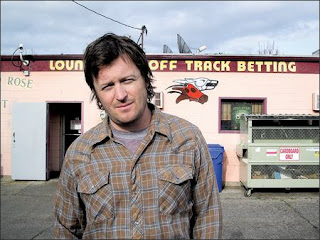 |
| Count Fleet |
My grandfather kept a portrait of the great Count Fleet in his house in Clay, Kentucky. Other family portraits had their space, too, but I remember that horse better than I remember my ancestors. My grandfather and grandmother took me to the races every Friday afternoon in August at the track in Henderson, Kentucky, Ellis Park, or as they called it, Dandy Dade, which had been its name before James C. Ellis bought it in 1925. Yeah, we're going back a ways.
Since the late 1950s, I have followed the Kentucky Derby, some years with more interest than others. The first Derby winner I can remember was Tim Tam, who would have won the Triple Crown in 1958 if he hadn't fractured a sesamoid bone during the Belmont. He still finished second. Just as my interest started to wane, after I'd moved from Kentucky and gone to college, Secretariat scooped me back into the fold in 1973. And tomorrow, the first Saturday in May, I'll be watching when this year's top 3-year-olds, minus several of the early favorites already brought down by injury or gastro-intenstinal distress (Uncle Mo), test the Churchill Downs oval and that long home stretch.
All of this is just to say that horse racing is somewhat more important to me than to most people these days, though not so central as it once was to the culture at large, when the Man o' Wars, War Admirals, Sea Biscuits and Citations drew vast crowds and radio audiences.
In honor of this year's Derby and good old Dandy Dade, I decided to read Willy Vlautin's novel Lean on Pete, which starts at Portland Meadows race track before setting off on a little odyssey across the American West.
My original intention was to compare it to another recent horse racing novel, Jaimy Gordon's Lord of Misrule, which won the National Book Award. Gordon's novel is set at a small track in West Virginia, but it swings into mythic territory pretty quickly. Gordon knows her racetrack, and the descriptive passages in Lord of Misrule sound absolutely authentic to me -- and if you're new to the horse racing game, it even serves as a good primer to how the business end of it works. But magic is afoot in Lord of Misrule, poetry even, multiple voices and points of view, characters cracking and re-assembling themselves, and the horses take on the characteristics of "winged steeds," creatures that are only partly biological.
Vlautin's novel is another sort altogether, told from a single viewpoint, that of its 15-year-old protagonist Charley Thompson, and resolutely naturalistic. Magical and Romantic? Not a bit, unless you consider the attraction of a broken down racehorse to a lost teenager either one (or both). And maybe it is, and maybe that's the point?
 |
| Willy Vlautin |
At first, Charley's story, which Vlautin tells in the simplest possible language, seemed too flat to me, a minute tracking of all his movements (and menus!) without the refreshment of reflection. Charley isn't looking for meaning -- he's trying to get through the day. His descriptions aren't idle, either. They are intimately connected to his survival. And once that came clear, I started parsing his observations for signs of potential resources for Charley or signs of possible danger.
The specifics of the plot matter desperately to the novel, therefore. Charley finds himself living on his own. He's exploited by a trainer/owner at Portland Meadows, who introduces him to life and the characters at the track. He "falls" for a horse, who is called Lean on Pete, a quarter horse who at the age of five has already outlived his usefulness. And when Pete's ultimate fate comes clear to him, Charley horsenaps him and heads for Wyoming, where maybe Charley's aunt still lives. A series of calamities befalls him, some caused by bad luck and some by rotten people he meets along the way, people living as close to the margins of American life as Charley is, people who often can't be trusted.
This collection of thieves, cutpurses and addicts is positively Dickensian. The road of a broke kid on the lam -- from the bad dreams of his former life, from the authorities -- isn't easy. When he meets someone who offers him a hand, we get a few pages of relief, though we're pretty certain that further calamities await.
Somehow, these simple declarative sentences become eloquent. They track the contours of the West, of the urban edges that Charley inhabits, of Charley's own desires, without flights of fancy, data point by data point as Charley enacts his impulses -- to run away with Pete, to skip out on his halfway house, to seek revenge in Denver. Sometimes, Vlautin doesn't even note a thought process -- Charley can be pure action, pure reflex.
Kids teetering on the brink -- it's a class of humans, sure, but each has arrived at the edge by a different route, with a different set of memories, values, skills and hopes. Vlautin takes us deep into the life of one of them, and we instantly start rooting for him, trying to come up with a reasonable course of action for him as he ricochets from Portland to Denver to Wyoming. And maybe in the process Vlautin teaches us something about how valuable one note of grace can be in a life, especially a young life.
So, no, not a race horse novel, and nothing I'll see at the Derby tomorrow -- the obligatory Great Hats and Mint Juleps, the crew of colts breaking from the starting gate, each beautifully conformed -- will remind me that somewhere near me, a kid is trouble. Except this intersection with Lean on Pete.
NOTES:
Vlautin's novel was a winner at this year's Oregon Book Awards. His first novel, The Motel Life, is being made into a movie starring Emile Hirsch.
No comments:
Post a Comment